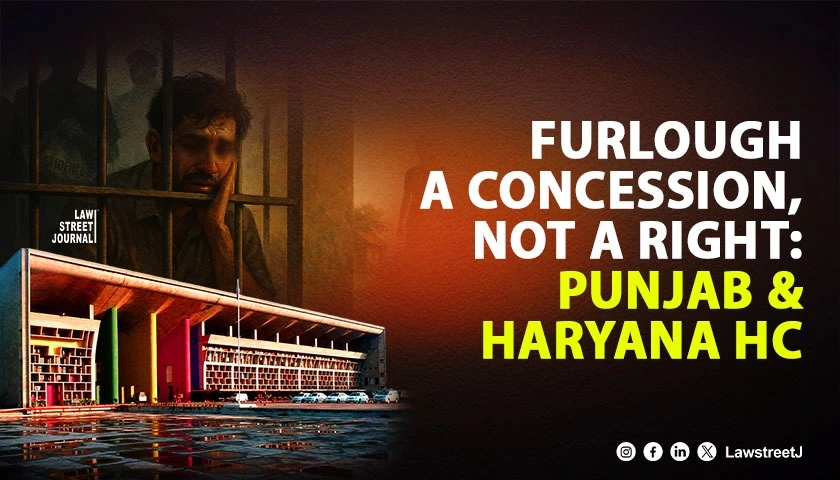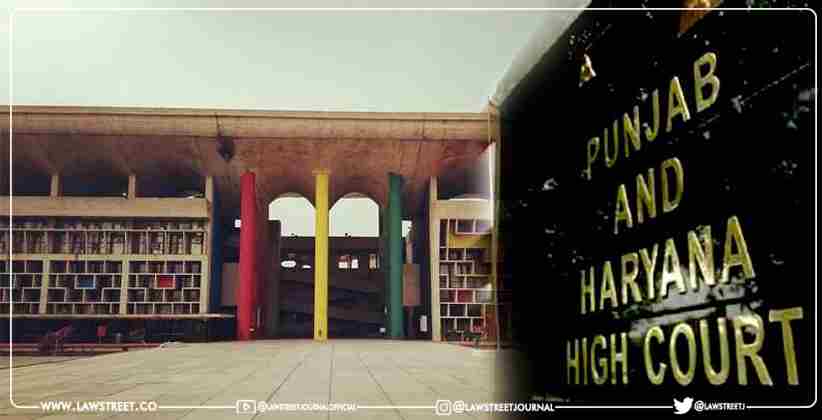Punjab: The Punjab and Haryana High Court has upheld the denial of furlough to a life convict, ruling that temporary release is a discretionary concession and not a vested right, while emphasizing that parole applications must be decided under prevailing laws rather than those in force at the time of conviction.
Justice Sandeep Moudgil delivered the judgment while dismissing a petition challenging the jail superintendent’s refusal to grant four weeks’ furlough to a prisoner convicted of murder with the intention to collect ransom.
The court addressed Criminal Writ Petition No. 5022 of 2025 filed by Sonu alias Amar against the State of Haryana and others, seeking to quash the speaking order dated April 24, 2025, passed by the Superintendent of District Jail, Sonipat, denying furlough.
The petitioner was convicted in FIR No. 275 dated December 26, 2005, registered under Sections 302, 328, 364-A, 120-B, 506, 201, 34 of the IPC at Police Station Gannaur, District Sonipat. He was sentenced to rigorous imprisonment for life with a fine of ₹38,000, and his appeal before the High Court was dismissed on October 11, 2012.
The petitioner had sought temporary release on furlough for four weeks to attend to his aged parents and perform family obligations, arguing that he had earned remission through good conduct in jail. His counsel contended that the jail superintendent acted independently without forwarding the matter to higher authorities.
The state opposed the plea, noting that the petitioner had already availed parole 16 times under the Parole Act, 2012, but was now ineligible under the new Haryana Good Conduct Prisoners (Temporary Release) Act, 2022.
Justice Moudgil examined Section 4(3) of the 2022 Act, which specifically excludes certain categories of prisoners from furlough eligibility. The provision states: “convicted prisoners sentenced under… murder with intention of collecting ransom or extortion… or sentenced to undergo imprisonment till natural life shall not be eligible for furlough.”
The court emphasized the philosophical underpinning of prison systems, observing: “There can’t be a society without crimes. Man essentially is a fighting creature, thus to think about a crimeless society is meaningless.” The judgment further noted: “The institution of prison is indispensable for every country, including India, to punish convicted criminals and maintain law and order, peace, and security.”
Justice Moudgil distinguished between parole and furlough, stating that both “are parts of the penal and prison system for humanizing prison administration but the two have different purposes.” The court emphasized that “Furlough is not a matter of right; it is not a guaranteed benefit, but a discretionary concession.”
The court cited the precedent in Ajay Jadeja alias Janak vs. State of Haryana, which held that “The right of a convict to get himself released temporarily on parole is not a substantive right. It is a concession given to a convict during his imprisonment, on fulfilling certain conditions.”
Clarifying the temporal application of parole laws, the court stated: “The grant of parole/furlough is to be considered as per law applicable on the date of consideration of parole and not on the date of conviction.” This principle was reinforced by Vakil Raj vs. State of Haryana, which established that amended definitions apply to all convicts regardless of the date of conviction.
Justice Moudgil concluded that the petitioner, classified as a “hardcore prisoner” under the 2022 Act, did not meet the criteria for furlough. The court stated: “No prisoner has a vested right to get the benefit of temporary release on parole/furlough. It is a concession, which is given to a prisoner on fulfilling certain conditions.”
The judgment emphasized that security considerations can override humanitarian concerns in exceptional cases, noting: “For the sake of the security of society, furlough can be rejected in the rarest of rare cases.”
Accordingly, the High Court upheld the jail superintendent’s order dated April 24, 2025, holding that the petitioner’s conviction for murder with intent to collect ransom specifically disqualified him from furlough under the prevailing statutory framework.
Mr. Randeep Singh Dhull, Advocate, appeared for the petitioner, while Mr. Baljinder Singh Virk, Senior Deputy Advocate General, appeared for the State of Haryana.
Case Title: Sonu alias Amar vs. State of Haryana and Others




![Police protection to fund manager alleging threat from Kirron Kher & aide: Punjab & Haryana HC [Read Order]](/secure/uploads/2023/12/lj_9007_Police_Kirron_Kher.jpg)
![Most interested witness being the father of deceased, SC upholds acquittal of 6 accused for murder [Read Judgment]](/secure/uploads/2023/12/lj_9904_df2c02a2-d8c5-4dd6-8b58-a59e17b8635b.jpg)
![Supreme Court Collegium approves new Chief Justices for five key High Courts in India [Read Recommendations]](/secure/uploads/2023/12/lj_8000_380d1135-6f3a-4988-a00a-4d5cd5901815.jpg)




